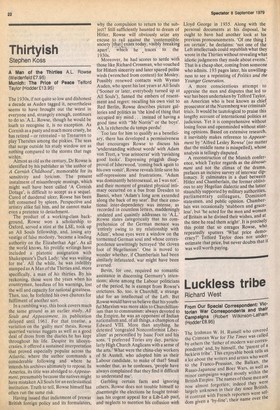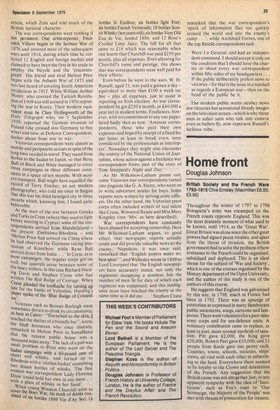Luckless tribe
Richard West
From Our Special Correspondent: Victorian War Correspondents and their Campaigns (Robert Wilkinson-Latham (Hodder £8.95) The Irishman W. H. Russell who covered the Crimean War for The Times was called by others the 'father of modern war correspondents' and, by himself, the 'parent of a luckless tribe'. This enjoyable book tells us a lot about the writers and artists who went to the Franco-Prussian, the Balkan, the Russo-Japanese and Boer Wars, as well as minor campaigns waged mostly within the British Empire. The names of these men are now almost forgotten; indeed they were largely unknown in their day since British, in contrast with French reporters were seldom given a 'by-line's their name over the
article, which Zola said told much of the British national character.
The war correspondents were nothing if not persistent. One artist-reporter, Frederick Villiers began in the Serbian War of 1876 and covered most of the subsequent wars until 1914, during which time he collected 12 English and foreign medals and claimed to have been the first in his trade to employ the bicycle and the 'cinemato
graph'. His friend and rival Melton Prior began with the Ashanti War of 1 873 and
vvas last heard of covering South American revolutions in 1912. While William Arthur Moore, who covered the Turkish Revolution of 1909 was still around in 1950 reporting the war in Korea. Their modern equi valent must be Clare Hollingworth of the Daily Telegraph who, on I September 1939, reported the German invasion of Poland (she crossed into Germany to buy wine) and now, as Defence Correspondent, dashes about from war to war.
Victorian correspondents were almost as mobile and peripatetic as ours in spite of the
long time needed in travel. They raced from Serbia to the Sudan to Japan, so that Rene. Bull of Black and White managed to cover three campaigns in three different conti
nents in a space of ten months. With modern transport, Bull might have equalled the record of Terry Fincher, an ace modern Photographer , who told me once in Saigon that this was his third beseiged city in three months which, knowing him, I found quite believable.
At the start of the war between Greeks and Turks in Crete (where they used to fight before moving to Cyprus) some of the cor
respondents arrived from Matabeleland — the present Zimbabwe-Rhodesia — and
'Melton Prior had arrived via China where he had observed the Germans taking possession of Kiaochow, while Rene Bull arrived direct from India , In Crete, as in most campaigns, the regular corps got on well, but quarrels arose between some of the fancy writers, in this case Richard Hard
ing Davis and Stephen Crane who had written The Red Badge of Cotirage. When Crane pleaded the toothache for turning up ,late for the battle of Velestino, Harding's Paper spoke of the 'Blue Badge of Cowardice'.
Veterans such as Bennet Burleigh were sometimes driven to drink by circumstance, as here at Cairo: "Drenched to the skin, reached the shelter of a friendly bar", wrote . the bluff Scotsman who once dismally remarked to Melton Prior in Somaliland that the nearest public house was a thousand miles away.' The lack of a pub was small problem to Prior who went on the Sudan campaign with a 60-pound case of Claret and whisky, and turned up in Rhodesia with a 'clothes basket' containing two dozen bottles of whisky. The first woman war correspondent Lady Florence Dixie 'could hold her own in any mess — with a glass of whisky in her hand'. When young Winston Churchill went to cover the Boer War, his stock of drinks consisted of six bottles 1889 Via d'Ay Sec; 18,
bottles St Emilion; six bottles light Port; six bottles French Vermouth; 18 bottles Scotch Whisky (ten yea rs o Id) ; six bottles Very Old Eau de Vie. landed 1886, and 12 Rose's Cordial Lime Juice. The bill for all that came to £16 which was reasonable when one learns that Churchill was paid £250 per month, plus all expenses. Even allowing for Churchill's name and prestige, this shows that war correspondents were well paid for their efforts.
Even before he went to the wars, W. H. Russell, aged 21, was paid a guinea a day — equivalent to more than £100 a week tax free — plus all expenses, just to assist in reporting an Irish election. As war correspondent he got £250 a month, or £40,000 a year net in modern terms. Freelances, however, with no commitment to any one paper, fared badly then as now. 'Amateur correspondents, those who paid their own expenses and hoped by receipt of a fixed fee per letter at least to break even, were considered by the professionals as interlopers'. Nowadays they might also encounter the enmity of the National Union of Journalists, whose action against a freelance war correspondent forms part of the story of Tom Stoppard's Night and Day.
As Mr Wilkinson-Latham points out, some Victorian war correspondents turned into jingoists like G. A. Henty, who went on to write adventure stories for boys. Some reports were written by serving army officers. On the other hand, the Victorian press corps often included writers of real talent like Crane, Winwood Reade and Miss Mary Kingsley (not 'Mrs' as here described).
War correspondents have constantly been abused for accepting censorship. Here Mr Wilkinson-Latham argues, to good effect, that newspaper reports actually could and did provide valuable news to the enemy. 'Napoleon, it was once said, remarked that "English papers make my best spies" ', and Wellesley wrote in 1809 to. Lord Liverpool that 'the English newspapers have accurately stated, not only the regiments occupying a position, but the number of men fit for duty of which each regiment was composed; and this intelligence must have reached the enemy at the same time as it did me . ' Stephen Crane remarked that the war correspondent's 'spark of information flies too quickly around the world and into the enemy's camp. . . ', while Archibald Fornes, one of the top British correspondents said; Were 1 a General, and had an independent command, 1 should accept it only on the condition that I should have the charter to shoot every war correspondent within fifty miles of my headquarters . . If the public deliberately prefers news to victories—for that is the issue in a nutshell as regards a European war — then on the head of the public be it.
The modern public wants neither news nor victories but sensational bloody images on the television screen — which is why those men in safari suits who talk into camera even as bullets fly, now represent Russell's luckless tribe.



































 Previous page
Previous page